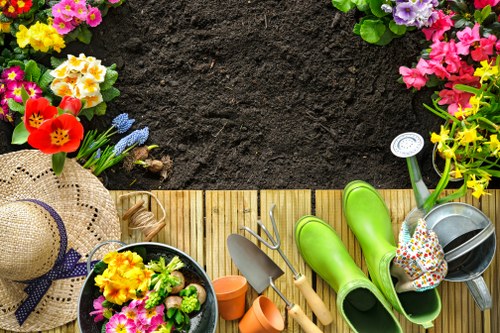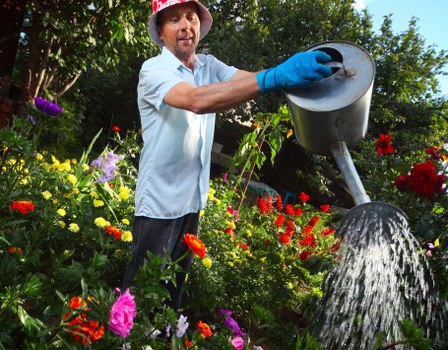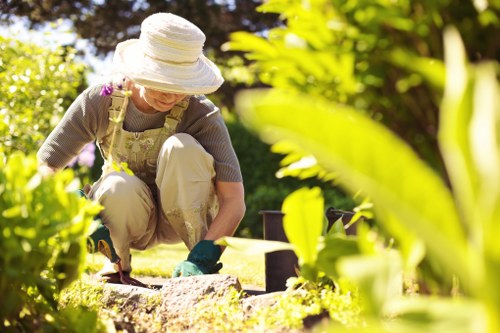Garden Maintenance in St Johns Wood
Introduction to Garden Maintenance

Maintaining a beautiful garden in St Johns Wood requires dedication, knowledge, and the right resources. Whether you’re a seasoned gardener or a beginner, understanding the essentials of garden upkeep can transform your outdoor space into a vibrant and relaxing oasis.
St Johns Wood, known for its picturesque residences and lush greenery, offers a unique environment for garden enthusiasts. The climate, soil type, and local flora play significant roles in determining the best maintenance practices for your garden.
In this guide, we will explore comprehensive strategies for effective garden maintenance in St Johns Wood, covering everything from soil preparation to seasonal care tips.
Understanding the Local Climate

St Johns Wood experiences a temperate climate, characterized by mild winters and warm summers. This climate is conducive to a wide variety of plants, but it also presents specific challenges that gardeners need to address.
Proper irrigation and drainage are crucial, especially during the summer months when heat can stress plants. Implementing efficient watering systems ensures that your garden remains hydrated without wasting water.
Additionally, understanding the frost dates and seasonal changes helps in planning planting schedules and protecting sensitive plants during colder periods.
Soil Preparation and Fertility

The foundation of a healthy garden lies in well-prepared soil. Testing the soil's pH, nutrient levels, and texture is the first step in creating an optimal environment for plant growth.
Amending the soil with organic matter such as compost or well-rotted manure can improve soil structure, enhance nutrient availability, and increase microbial activity. Regularly adding mulch helps maintain moisture, suppress weeds, and regulate soil temperature.
Choosing the right fertilizers based on soil test results ensures that plants receive the necessary nutrients without the risk of over-fertilization, which can harm both plants and the environment.
Plant Selection and Arrangement

Selecting plants that thrive in St Johns Wood’s climate is essential for a resilient garden. Opt for native species and those adapted to the local conditions to reduce maintenance efforts and increase sustainability.
When arranging plants, consider factors such as sunlight exposure, water needs, and growth habits. Grouping plants with similar requirements together simplifies care routines and promotes healthier growth.
Incorporating a mix of perennials, shrubs, and annuals can add texture, color, and year-round interest to your garden. Additionally, strategic placement of trees can provide shade, reduce wind exposure, and create focal points.
Seasonal Garden Maintenance

Maintaining your garden throughout the year requires understanding the specific tasks needed each season. Spring involves preparing beds, planting new additions, and managing early pests.
During the summer, focus on regular watering, weeding, and monitoring for signs of plant stress or disease. Proper pruning and deadheading can encourage continuous blooming and healthy growth.
Autumn is ideal for planting bulbs, clearing fallen leaves, and preparing the garden for winter by protecting sensitive plants and tools. Winter maintenance includes planning for the next growing season and safeguarding perennials against frost.
Lawn Care and Maintenance
Choosing the Right Grass
A lush, green lawn is a cornerstone of any well-maintained garden. Selecting a grass variety suited to St Johns Wood’s climate ensures resilience and ease of care. Popular choices include perennial ryegrass and fescues, known for their durability and aesthetic appeal.
Regular mowing, watering, and fertilizing keep your lawn healthy and vibrant. Maintaining the correct mowing height promotes deep root growth and helps the grass withstand drought and foot traffic.
Implementing aeration and overseeding practices can address soil compaction and promote dense, weed-resistant turf. Additionally, proper pest and disease management is crucial for maintaining a pristine lawn.
Hardscape and Garden Features
Incorporating Functional Elements
Enhancing your garden with hardscape features such as pathways, patios, and garden beds adds functionality and aesthetic value. Using materials like stone, brick, or gravel can complement the natural beauty of your garden while providing structure.
Water features like ponds or fountains introduce a soothing element and can attract beneficial wildlife. Proper maintenance of these features, including water quality and filtration, ensures their longevity and appeal.
Garden lighting not only highlights key areas during the evening but also extends the usability of your garden space. Solar-powered options offer energy efficiency and ease of installation.
Pest and Disease Management
Identifying Common Issues
Maintaining a healthy garden involves proactive management of pests and diseases. Regular inspections help in early identification and treatment of issues before they become severe.
Integrated Pest Management (IPM) strategies combine biological, cultural, and chemical methods to control pests sustainably. Encouraging beneficial insects, using natural repellents, and selecting disease-resistant plant varieties are effective practices.
Proper sanitation, such as removing fallen leaves and debris, reduces hiding spots for pests and decreases the likelihood of disease outbreaks. Consistent monitoring and timely interventions maintain garden health.
Tool and Equipment Maintenance
Ensuring Longevity and Efficiency
Having the right tools is essential for effective garden maintenance. Investing in high-quality equipment such as pruners, lawnmowers, and irrigation systems can significantly reduce labor and improve outcomes.
Regular cleaning and sharpening of tools extend their lifespan and ensure they perform optimally. Proper storage protects equipment from the elements and prevents unnecessary wear and tear.
Keeping an inventory of necessary tools and scheduling maintenance tasks enhances efficiency and readiness for various garden projects throughout the year.
Hiring Professional Garden Maintenance Services
Benefits of Expert Assistance
While DIY garden maintenance is rewarding, hiring professional services in St Johns Wood can offer expertise and save time. Professionals bring specialized knowledge of local conditions and advanced techniques to maintain your garden’s health and beauty.
Professional landscapers can design tailored maintenance plans, addressing specific needs and preferences. Their services may include regular upkeep, seasonal planting, pest control, and landscape enhancements.
Outsourcing garden maintenance allows homeowners to enjoy a well-maintained garden without the hassle of managing all tasks themselves, ensuring consistent and high-quality results year-round.
Eco-Friendly Garden Practices
Sustainable Maintenance Techniques
Adopting eco-friendly practices in garden maintenance supports environmental sustainability and promotes a healthier ecosystem. Using organic fertilizers and pest control methods minimizes chemical usage, protecting beneficial insects and soil health.
Implementing water conservation techniques, such as rainwater harvesting and mulching, reduces water consumption and preserves this valuable resource. Native plants also require less water and maintenance, thriving naturally in the local climate.
Composting garden waste recycles nutrients back into the soil, enhancing fertility and reducing landfill contributions. Sustainable practices contribute to a resilient and vibrant garden ecosystem.
Planning for Future Growth
Long-Term Garden Strategies
Long-term planning ensures your garden remains beautiful and functional as it evolves. Consider the mature size of plants, their growth patterns, and how they fit into the overall landscape design.
Regularly updating your garden plan accommodates new plantings, changing aesthetics, and emerging trends. This proactive approach allows you to address issues promptly and adapt to seasonal changes effectively.
Incorporating elements like vertical gardening, companion planting, and wildlife-friendly features can enhance biodiversity and garden resilience, preparing your garden for future growth and sustainability.
Conclusion
Maintaining Your St Johns Wood Garden
Effective garden maintenance in St Johns Wood combines knowledge of local conditions with dedicated care practices. From soil preparation to seasonal tasks, each aspect contributes to a thriving and beautiful garden space.
Whether you choose to manage your garden yourself or hire professional services, prioritizing regular maintenance ensures lasting beauty and functionality. Embrace sustainable practices to create an environmentally friendly and resilient garden that reflects the charm of St Johns Wood.
Ready to transform your garden? Contact us today to book your garden maintenance service and take the first step towards a stunning outdoor sanctuary.